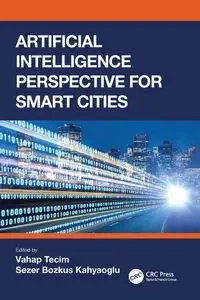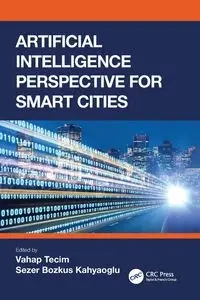Artificial Intelligence Perspective for Smart Cities - Tecim Vahap
The concept of a "smart city" is used widely in general; however, it is hard to explain because of the complexity and multidimensionality of this notion. However, the essential qualification for being a smart city is to achieve "sustainable social, environmental, and economic development" and boost the living standards of society based on Information and Communication Technology (ICT) and Artificial intelligence (AI). AI in smart cities has become an important aspect for cities that face great challenges to make smart decisions for social well-being, particularly cybersecurity and corporate sustainability. In this context, we aim to contribute literature with a value-added approach where various AI applications of smart cities are discussed from a different perspective. First, we start by discussing the conceptual design, modeling, and determination of components for the sustainability of a smart city structure. Since smart cities operate on spatial-based data, it is important to design, operate, and manage smart city elements using Geographical Information Systems (GIS) technologies. Second, we define the structure, type, unit, and functionality of the layers to be placed on the GIS to achieve best practices based on Industry 4.0 components. Transportation is one of the key indicators of smart cities, so it is critical to make transportation in smart cities accessible for different disabled groups by using AI technologies. Third, we demonstrate what kinds of technologies should be used for which disabled groups in different transportation vehicles with specific examples. Finally, we create a discussion platform for processes and sub-processes such as waste management, emergency management, risk management, and data management for establishing smart cities including the financial and ethical aspects.
EAN: 9781032136202




The concept of a "smart city" is used widely in general; however, it is hard to explain because of the complexity and multidimensionality of this notion. However, the essential qualification for being a smart city is to achieve "sustainable social, environmental, and economic development" and boost the living standards of society based on Information and Communication Technology (ICT) and Artificial intelligence (AI). AI in smart cities has become an important aspect for cities that face great challenges to make smart decisions for social well-being, particularly cybersecurity and corporate sustainability. In this context, we aim to contribute literature with a value-added approach where various AI applications of smart cities are discussed from a different perspective. First, we start by discussing the conceptual design, modeling, and determination of components for the sustainability of a smart city structure. Since smart cities operate on spatial-based data, it is important to design, operate, and manage smart city elements using Geographical Information Systems (GIS) technologies. Second, we define the structure, type, unit, and functionality of the layers to be placed on the GIS to achieve best practices based on Industry 4.0 components. Transportation is one of the key indicators of smart cities, so it is critical to make transportation in smart cities accessible for different disabled groups by using AI technologies. Third, we demonstrate what kinds of technologies should be used for which disabled groups in different transportation vehicles with specific examples. Finally, we create a discussion platform for processes and sub-processes such as waste management, emergency management, risk management, and data management for establishing smart cities including the financial and ethical aspects.
EAN: 9781032136202

